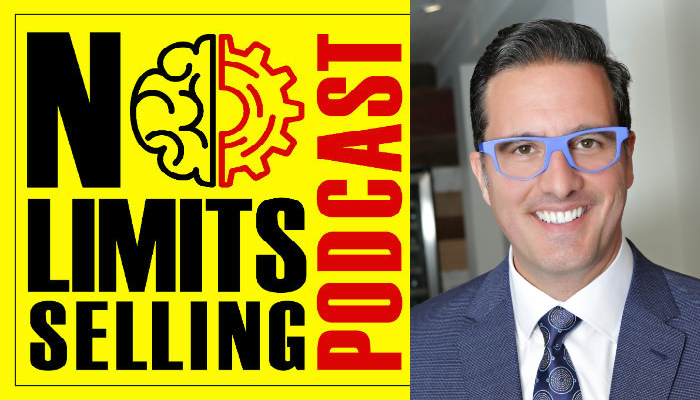How to Build A High Velocity Team by Conrad Zurini
On Episode 234 of The No Limits Selling Podcast, we have Conrad Zurini, Broker Owner of RE/MAX Escarpment Realty Inc., Brokerage, and RE/MAX Niagara Realty Ltd. Brokerage. Growing up in the family business founded by his parents in 1980, Conrad Zurini has developed a real passion for Real Estate and a commitment to improving the overall client experience. With over 20 years of experience in both Selling and Managing, he has had many achievements in both sales performance and industry development.
Born and raised in Hamilton and a graduate of McMaster University, Conrad is an active member of the community and is committed to improving the city where he grew up and in which his business operates today.
He is an integral part of developing affordable housing and city revitalization projects specifically within the Hamilton region. His other areas of focus include; land development, commercial investment, and luxury residential properties.
Conrad Zurini is the President and Broker of Record for RE/MAX Escarpment Realty Inc.; servicing the community with its 8 locations. Through his active role in sales, Conrad remains a leader in the industry and maintains a relevant insight into client expectations, market trends, and the latest technological advances in Real Estate marketing.
As such, he is better able to train his sales team and all agents at RE/MAX Escarpment to continue to be the top producers in the community. In July 2011, RE/MAX was awarded the JD Power and Associates Award for Highest Overall Customer Satisfaction for both Buyers and Sellers and Conrad has made it his mission to ensure this award keeps coming back to his Company and its Agents.
In this episode, Conrad shares with us how to build high velocity teams.

Contact Conrad:
[EDITOR’S NOTE: This podcast is sponsored by No Limits Selling. It is a fun, fast-paced podcast that delivers hard-fought business advice that you can implement today to improve your sales and performance]
Interested In Our Real Estate Coaching Services? Explore Our Website: Link
Feeling Not Well Today? You Can Use Our Mindset Boosters App To amp Up Your Mood: Link
Find us on Social Media:
LinkedIn | Facebook community | Instagram
Like what do you listen to? Subscribe to our podcast!
Ready to become fearless? We can help you become fearless in 60 days so you accomplish more in your career Schedule A 15 min Call with Umar
Summary
Introduction and Guest Background
The podcast begins with an introduction of the guest, Conrad Zurini. Conrad has been in the real estate business for over 30 years and is the owner of RE/MAX Escarpment and RE/MAX Niagara. These companies are leading entities in their respective markets. Conrad started his journey in real estate at the young age of 18, influenced by his family who were also in the same business.
The Role of Mindset in Success
In the next section, Conrad discusses the importance of mindset in achieving success in building a high velocity team. He emphasizes that he has always been a big believer in personal development. Over the years, he has invested significantly in coaching and training to enhance his skills and knowledge. He believes that a positive and growth-oriented mindset within the team is a key factor in his success in the real estate industry.
Facing and Overcoming Challenges
Conrad then shares some of the challenges he has faced in his career. He talks about the ups and downs of the real estate market and how he navigated through them. He underscores the importance of resilience and perseverance in overcoming these challenges. Conrad believes that facing difficulties and overcoming them has made him build stronger, high velocity teams, and more adept in his business.
Advice for Success in Real Estate
In this section, Conrad provides advice for those seeking success in the real estate business. He emphasizes the importance of being customer-focused. According to him, providing excellent service to clients is paramount in this industry. He also highlights that having a high velocity team is important. Conrad believes that success in real estate requires commitment, hard work, a strong work ethic, and a continuous desire to learn and improve.
Conclusions
In this podcast, Conrad Zurini, a seasoned real estate professional and owner of RE/MAX Escarpment and RE/MAX Niagara, shares his journey and insights from over 30 years in the industry. Starting his career at 18, Conrad attributes his success to a growth-oriented mindset, significant investment in personal development, and resilience in overcoming market challenges. He emphasizes the importance of building a high velocity team, customer focus, excellent service, and a strong work ethic as key to success in real estate.
Conrad's story is a testament to the power of perseverance, continuous learning, and commitment to service excellence in achieving professional success.
Faq
Who is Conrad Zurini?
What is Conrad Zurini's background in real estate?
What does Conrad Zurini believe is important for success in real estate?
How has Conrad Zurini overcome challenges in his career?
What advice does Conrad Zurini give for success in real estate?
What are Conrad Zurini's final thoughts on achieving success in real estate?
Don’t miss this opportunity to transform your real estate career with one-on-one coaching. As an experienced real estate coach, I, Umar Hameed, am dedicated to helping you unlock your full potential and achieve your real estate goals. To learn more about who am I and my clients ↓
If you’re ready to take the next step, book an appointment with me today and begin your journey toward success in the real estate industry.
